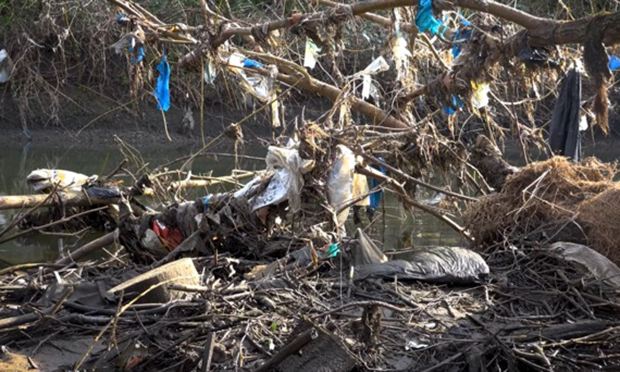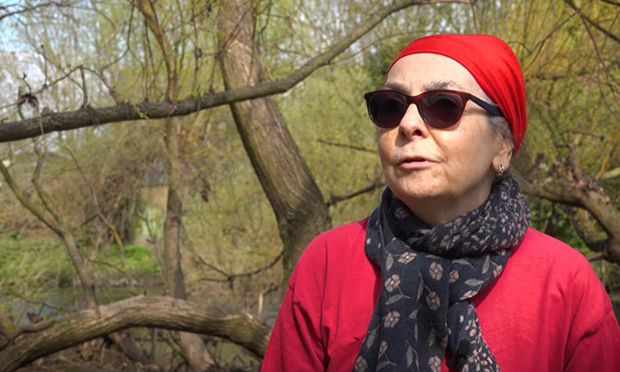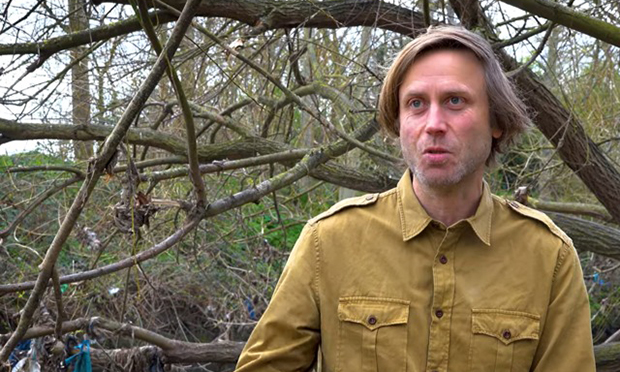Campaigners call for action on ‘jaw-dropping’ amount of pollution in River Lea

Campaigners are calling for tougher action to protect one of the most polluted rivers in the country after discovering raw sewage, wet wipes and plastic in the River Lea at Hackney.
They say it is a danger to humans and wildlife.
They have removed thousands of kilos of rubbish from the river over the last three years and were dismayed to see sewage after heavy flooding this year.
Celia Coram from Save Lea Marshes said: “There’s a lot of sewage – you can see evidence of that in the water.”
Residents say the rubbish needs to be seen as pollution and that the state of the river makes them wary of bringing children to see it as they are concerned about potential health risks.
The River Lea starts in the Chiltern Hills in Bedfordshire and joins the River Thames at Bow Creek, carrying rubbish along its way.
Environmental campaigner Julian Kirby said the river really suffered after floods in January – the worst in ten years – which dumped a lot of rubbish in the watercourse in Hackney.
“The floods left the river here in the worst state ever, said Kirby. “After the flood you could see such a ridiculous difference. It was so much worse seeing the river’s current state, it is just absolutely heartbreaking.
“I feel really angry. I don’t like feeling angry but I feel really angry when I come down here when I see all of this – it was just jaw-dropping.”
He added: “You just couldn’t believe how much worse it was. It’s a lot of sewage and you can actually see evidence of that floating in.”

Volunteers from Plastic Free Hackney have been working hard to fish rubbish out from the riverbanks.
They said they remove 100kg of rubbish every month during a two-hour pollution pick-up – that’s 3,600kg over the last three years.
Other groups who also do clean-ups include Stonebridge Lock Coalition, Lower Regents Canal and Wildlife Gardeners of Haggerston.
Daisy Hutchison from Plastic Free Hackney said companies producing the polluting rubbish should not be let off the hook: “So there are hundreds of unpaid volunteer hours every year going into looking after the river, while the polluting water companies and plastic producers carry none of the responsibility.”
Volunteers have found mattresses, car tyres, a gas heater, beer kegs, even a suitcase filled with shoes.
“Our hauls simply give us an indication of the huge quantity of pollutants the River has to contend with, and these are the visible ones,” said Hutchison.
“We recently started calling our clean-ups Pollution Picks rather than Litter Picks. Litter is a benign word, and frames the problem as entirely the fault of an individual’s behaviour, those thoughtless ‘litterers’.
“But blaming individuals is a deliberate tactic that plastic manufacturers have used for the past 70 years to divert responsibility from themselves, the producers of polluting materials, to us, the consumers.
“The waste material we collect is pollution, and needs to be named as such.”
She called for a stronger Environment Bill which would protect the River Lea from sewage spills and make plastic producers financially responsible for the pollution they produce.

Kirby explained that many of the plastic bags washed up in the river are exempt from the plastic bag levy because they are not ones used by shops.
He said volunteers have seen a lot more plastic washed up in trees along the riverbank and wet wipes. People flush these down the toilet and they can end up in the water.
He added: “Wet wipes are part plastic so they don’t decompose in the environment and they’re going to be choking animals, they’re going to be causing all sorts of health problems. “
“There are so many ways in which plastic harms wildlife and, worryingly, humans as well. We are increasingly finding out the smallest pieces carry diseases and they get right into bodies and they carry toxins with them that they’ve absorbed – even toxins abandoned a long time ago.”
He said: “The smaller plastics cross the blood brain barrier, across the placental membrane, across the gut lining, right into our tissues, and we now know that humans are absorbing these plastics with who-knows-what effect, but not a good one.”
Hackney Mayor Philip Glanville said: “It’s totally depressing seeing volunteers doing this work week in and week out. We want to stop it at source.”
He said that the funding for the Environment Agency has been cut, making it harder to deal with the problem, which is not going away.
Campaigners want the government to get tougher about plastic pollution.
Mayor Glanville hopes the Environment Agency will draw up a plan to tackle the problem.
“We can’t go on like this,” he said. “If we care about our rivers and our water courses we’ve got to invest in them.”
The Environment Agency responded: “We share residents’ concerns about the River Lea, and we are working with our partners to improve water quality.
“We secured a £250 million investment from Thames Water to upgrade Deephams Sewage Treatment Works [in Edmonton] and improve the quality of effluent discharging into the river.
“We have also worked closely with Thames Water on the Lee Tunnel, a huge sewer pipe preventing approximately 16 million tonnes of untreated sewage from discharging into the River Lea each year.”
The government agency said it was piloting a Hertfordshire and North London Incident Notification System to tell people about incidents affecting their watercourses. It is also working with members of the London River Lea Catchment Partnership to improve the river for wildlife and people.
The spokeswoman added: “Individual actions count. Many people are not aware that actions in the home can have a damaging impact on water quality. Small steps can help to protect water quality, such as not pouring fats and oils down the sink or flushing wet wipes and other plastic products down the loo.”

Plastic-Free Hackney carry out our pollution picks from the banks of the river, and occasionally have the benefit of a boater with us who can collect from the water – we’re always looking for boats! The brilliant volunteers who have been out in the kayaks cleaning up have been led by Dobbie Woods – a proper local hero.
That the Environment Agency finish their statement with a suggestion of how much comes down to individual responsibility is disheartening and infuriating.
https://www.plasticfreehackney.com/temporary-events
Thanks so much for this, very much appreciated.